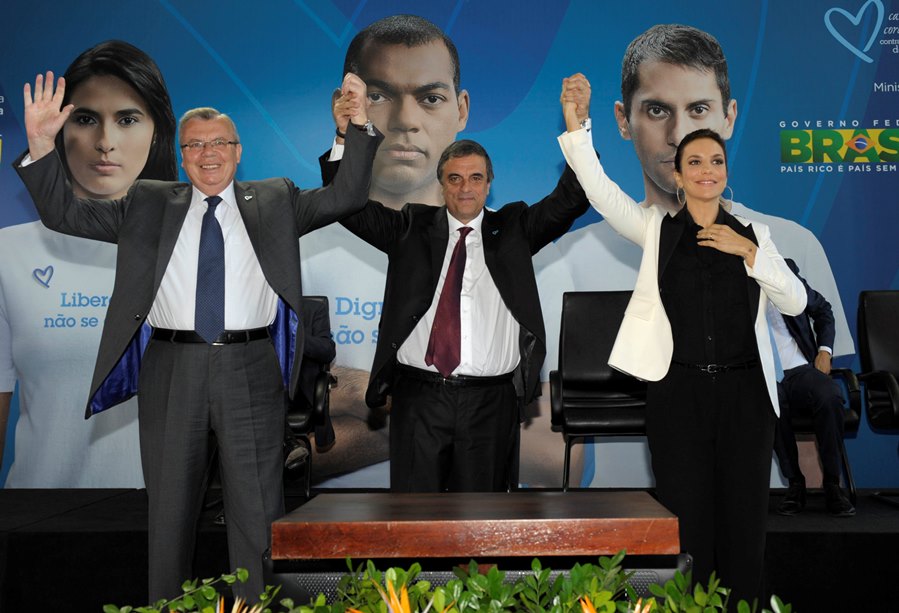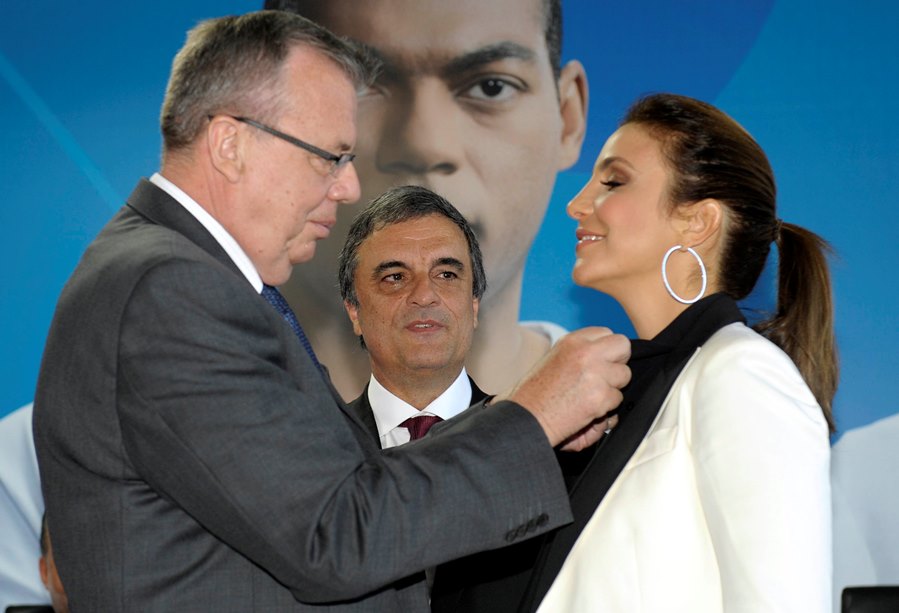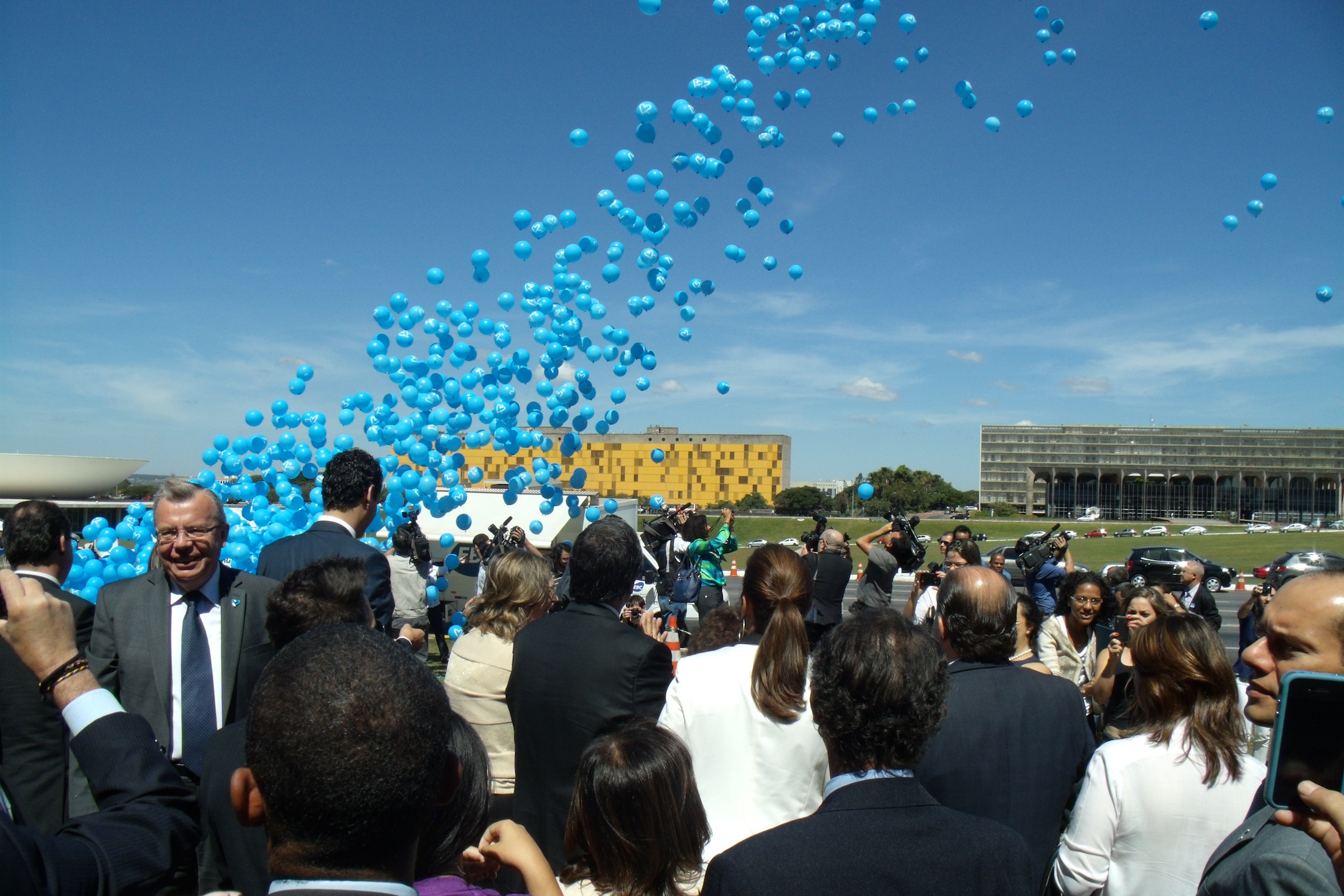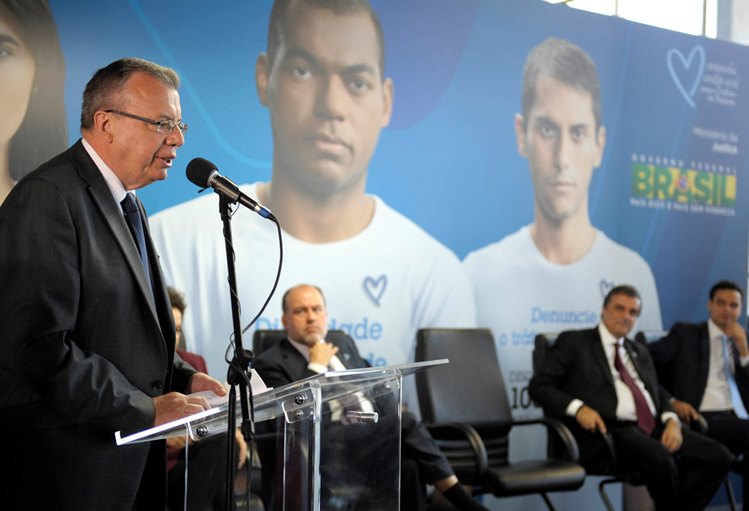Brazilian government launches UNODC Blue Heart campaign against trafficking in persons

|
| Yury Fedotov, José Cardozo and Ivete Sangalo |
Brasília, 10 May 2013 - The Ministry of Justice and the United Nations Office on Drugs and Crime (UNODC) launched yesterday the Blue Heart campaign against trafficking in persons in Brazil. The campaign, which is global, will now have its Brazilian version. It aims to mobilize society against this crime. Official reports show that there are more than 2 million victims of human trafficking across the globe.
The launch was held at the Ministry of Justice, with the presence of the Justice Minister José Eduardo Cardozo, the UNODC Executive Director, Yury Fedotov, and the singer Ivete Sangalo, who received from UNODC the title of National Goodwill Ambassador for Preventing and Combating Trafficking in Persons. During the event, the singer was officially appointed by Fedotov: "Ivete Sangalo is one of the most respected, popular and successful artists in Brazil. Her music transcends Brazilian borders. Now she will be able to lend her beautiful voice to those who have no voice".

|
| Fedotov presents a Blue Heart pin to Sangalo |
After thanking the appointment, Ivete explained that her role as the campaign's ambassador in Brazil will be to bring to the public the facts about this invisible crime, and remind people of the power of transformation they hold through denunciation. "The Blue Heart is a way of making the red heart beat", she said.
Implemented by UNODC in 10 countries, the campaign has the Blue Heart as its symbol, which represents the sadness of the victims of this type of crime and reminds us of the cold-heartedness of those who buy or sell other human beings. The use of the blue color also demonstrates the UN's commitment in combating trafficking in persons.
One of the pieces of the campaign will be an ad recorded and produced by TV network Globo with Ivete Sangalo.
The National Secretary of Justice, Paulo Abrão, the Minister of the Secretariat of Human Rights, Maria do Rosário Nunes, and the Minister for the Secretariat of Women's Policies, Eleonora Menicucci de Oliveira, also participated in the launch.
Combating trafficking in persons
For the Minister of Justice, the campaign puts into practice one of the main commitments of the II National Plan to Combat Trafficking in Persons, published recently: "The most important thing is always to avoid crime. Prevention will be stimulated by the campaign, so people can be conscious, denounce and allow the State to articulate its actions of repression and victim protection".
The UNODC executive director said that trafficking in persons involves millions of victims and is a source of billions of dollars for organized crime. "No country can escape from this terrible crime, which directly violates the most fundamental human rights. Trafficking in persons can happen in your country, in your city, in your street and even in your own house. That is exactly why the Blue Heart Campaign was created, to raise awareness at a global level about this problem that is all around us. Therefore, all the nations have the responsibility of confronting trafficking in persons", said Fedotov.

|
| Fedotov watches blue balloons being released at the end of the launch |
According to the UNODC executive director, in order to eradicate this crime, a comprehensive and coordinated approach is needed at national, regional and global levels: "In Brazil, the UNODC Liaison and Partnership Office is working to do that with the Ministry of Justice, through the National Plan to Combat Trafficking in Persons".
With the slogan "Freedom can't be bought. Dignity can't be sold. Denounce trafficking in persons", the Brazilian campaign inserts Brazil in the international advocacy movement against this crime.
For the National Justice Secretary, Paulo Abrão, the use of blue heart as common and universal symbol allows wide social mobilization, but mainly allows the identification of centers for support and denunciation. Paulo Abrão explains that the slogan chosen for the campaign's brand in Brazil is a restatement from Brazilian society that human beings are not commodities and that the government is determined to combat trafficking in persons.
To publicize the campaign, a hot site was created, as well as flyers, posters and pins which will be distributed in centers and offices for combatting trafficking in persons all over the country. The Secretariat for Human Rights, the Secretariat for Women's Policies and the TV network Globo are also partners of the campaign.
Numbers

|
|
Fedotov speaks at the launch of the campaign
|
Trafficking in persons is a crime that ruthlessly exploits women, children and men for countless reasons, including forced labor and sex. In Europe, it is estimated that trafficking in persons moves 2,5 billion Euros every year. All over the world, a population of up to 2,5 million people was victim of traffickers and is submitted to forced labor or sexual exploitation. UNODC reports reveal that 58% of the trafficked people are submitted to sexual exploitation and 36% to slavery.
In Brazil, between 2005 and 2011, 514 denunciations of this crime were investigated. Two thirds - 344 - of the enquiries are related to slavery. The other 157 are for international trafficking and 13 are for internal trafficking in persons, a type of crime in which the number of denunciations is quite low. The actions of the Brazilian State resulted in the indictment of 381 suspects. Because of the limits of the legislation and the difficulty in gathering proofs, only 158 were arrested.
Social participation
In addition to the efforts of governments and international organizations, the fight against trafficking in persons requires social mobilization and awareness from everyone. Each citizen has the duty of denouncing. For that, the Brazilian government provides a network of municipal and state centers, as well as offices for combating trafficking in persons, the consular network for support overseas, the emergency call service Disque 100 from the Secretariat for Human Rights, the emergency call service Ligue 180 from the Secretariat for Women's Policies. It is also possible to communicate with the coordination office for combating trafficking in persons, at the National Justice Secretariat, through the contact e-mail ( traficodepessoas@mj.gov.br) or through the denounciation e-mail of the Federal Police ( urtp.ddh@dpf.gov.br).
With the adhesion, Brazil commits to provide ways of raising awareness and mobilizing society in the fight against trafficking in persons. Everyone can participate: follow the Blue Heart in the internet, adopt this symbol on your Facebook profile, or on the webpage of your company. Wear the heart pin. Help to promote the campaign in your social networks and combat this crime.
Related information:
Yury Fedotov's speech during the launch of the Blue Heart campaign in Brazil
Press contacts:
Ministry of Justice - Press Office
Carolina Valadares
+55 (61) 2025-3135/3315
www.mj.gov.br
http://blog.justica.gov.br
UNODC - Communication Assistant
Ana Paula Canestrelli
anapaula.canestrelli@unodc.org
+55 (61) 3204-7206